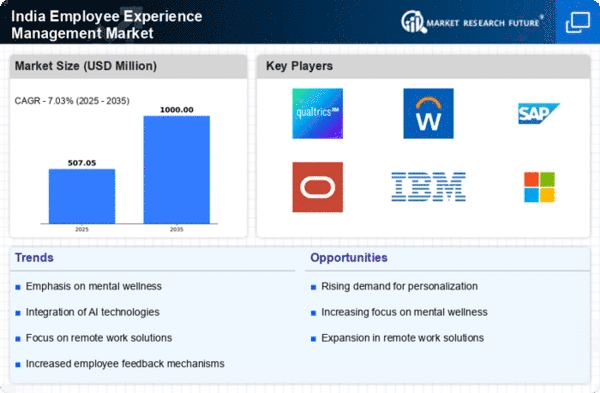Shift Towards Remote and Hybrid Work Models
The shift towards remote and hybrid work models is significantly influencing the employee experience-management market in India. As organizations adapt to these new work arrangements, there is a growing need for solutions that support remote employee engagement and collaboration. Data indicates that approximately 70% of employees prefer flexible work options, prompting companies to invest in technologies that enhance virtual communication and team cohesion. This transition necessitates a reevaluation of traditional employee experience strategies, leading to the development of tailored solutions that address the unique challenges posed by remote work. Consequently, the employee experience-management market is evolving to meet these demands, focusing on tools that promote connectivity and well-being in a dispersed workforce.
Emphasis on Diversity and Inclusion Initiatives
The emphasis on diversity and inclusion initiatives is reshaping the employee experience-management market in India. Organizations are increasingly aware of the benefits that diverse teams bring to innovation and problem-solving. Data shows that companies with diverse workforces are 35% more likely to outperform their competitors. This awareness is driving businesses to implement comprehensive diversity and inclusion strategies, which are integral to enhancing employee experience. By fostering an inclusive culture, organizations not only improve employee morale but also attract a wider talent pool. Consequently, the employee experience-management market is adapting to support these initiatives through tools that promote equitable practices and measure diversity metrics.
Rising Demand for Employee Engagement Solutions
The employee experience-management market in India is witnessing a notable rise in demand for employee engagement solutions. Organizations are increasingly recognizing the importance of fostering a positive workplace culture to enhance productivity and retention. According to recent data, companies that prioritize employee engagement report up to 20% higher productivity levels. This trend is driven by the need to create a more inclusive and motivating environment, which is essential for attracting top talent in a competitive job market. As a result, businesses are investing in tools and platforms that facilitate real-time feedback, recognition, and communication, thereby transforming the employee experience-management market into a vital component of organizational strategy.
Increased Investment in Learning and Development
Investment in learning and development is becoming a critical driver in the employee experience-management market in India. Organizations are increasingly allocating resources to upskilling and reskilling their workforce, recognizing that continuous learning is essential for maintaining competitiveness. Reports suggest that companies that invest in employee development see a 24% increase in employee satisfaction and a 21% increase in profitability. This focus on professional growth not only enhances employee engagement but also contributes to a more skilled and adaptable workforce. As a result, the employee experience-management market is witnessing a surge in demand for platforms that facilitate personalized learning experiences and career development opportunities.
Growing Importance of Employee Feedback Mechanisms
The growing importance of employee feedback mechanisms is a pivotal driver in the employee experience-management market in India. Organizations are increasingly recognizing that regular feedback is essential for understanding employee needs and improving workplace satisfaction. Studies indicate that companies with effective feedback systems experience a 14% increase in employee engagement. This trend is prompting businesses to adopt advanced feedback tools that facilitate continuous dialogue between employees and management. By leveraging these mechanisms, organizations can identify areas for improvement and implement changes that enhance the overall employee experience. As a result, the employee experience-management market is evolving to incorporate innovative feedback solutions that empower employees and foster a culture of open communication.
















